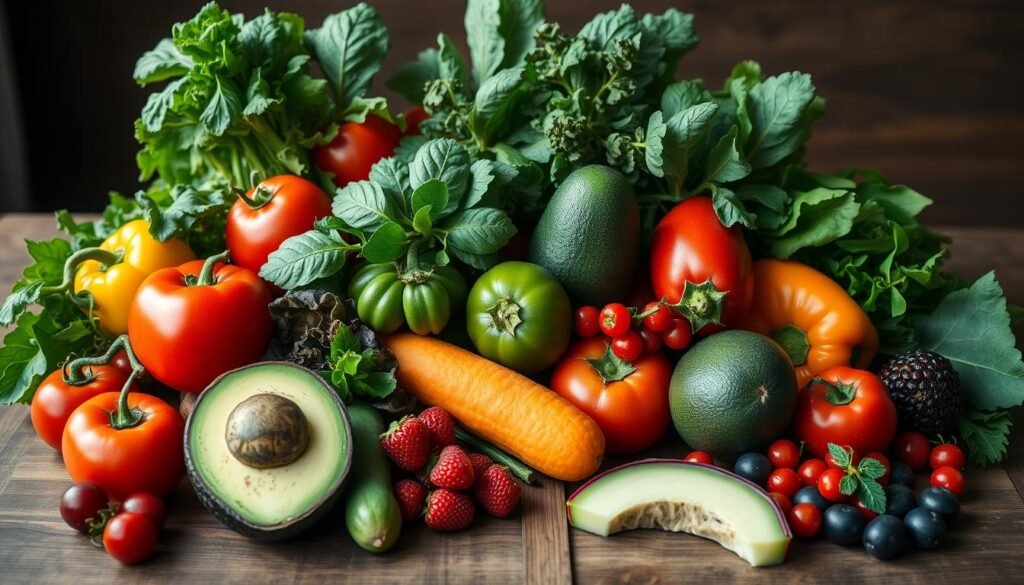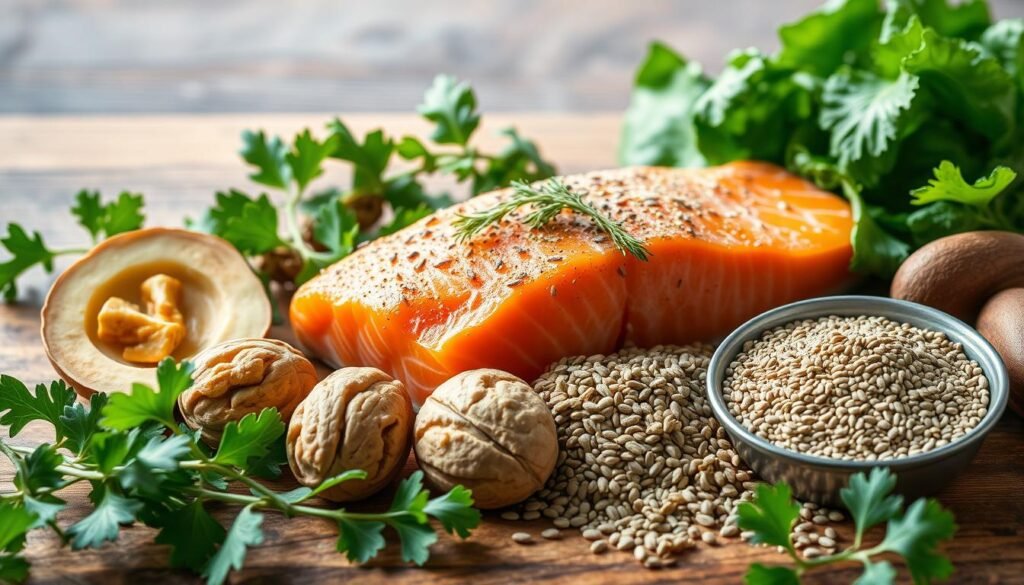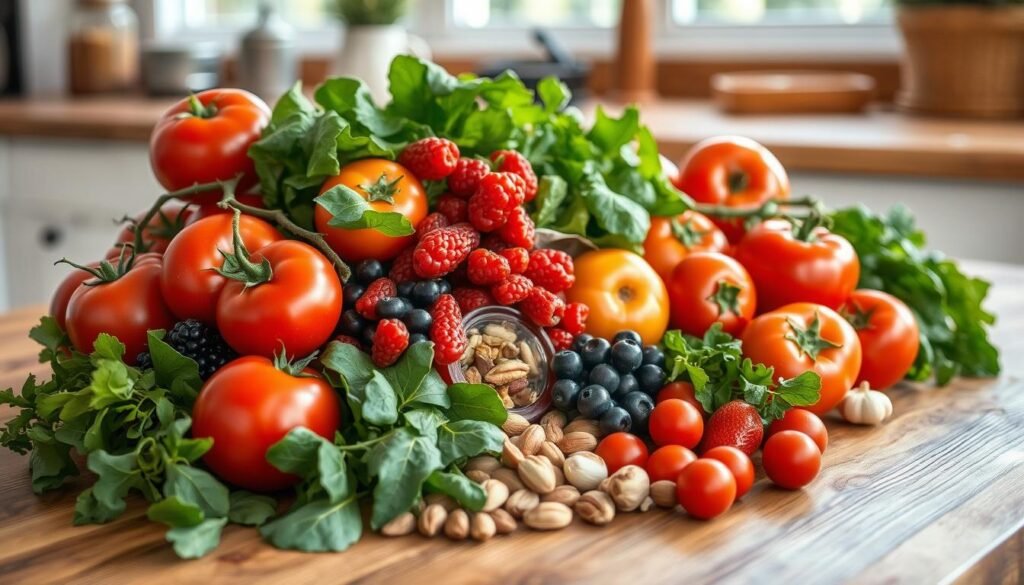Did you know that nearly 1 in 8 men will be diagnosed with prostate cancer in their lifetime? This is a shocking fact. It shows why knowing about a healthy diet is key in managing this disease. A focus on prostate cancer nutrition can greatly help with treatment and overall health. Studies indicate that certain cancer-fighting foods may lower inflammation. This could slow down the spread of prostate cancer.
Eating a mix of fruits, vegetables, whole grains, and healthy fats is crucial for prostate health. By choosing foods rich in nutrients, people can create a strong dietary base. This can help their body during the fight against cancer. For tips on what to eat for better prostate health, check out nutrition and prostate cancer education.
Key Takeaways
- A healthy diet can significantly impact the management of prostate cancer.
- Specific foods can help reduce inflammation and may slow the progression of the disease.
- Focusing on fruits, vegetables, whole grains, and healthy fats is essential.
- Understanding prostate cancer nutrition can empower men to take charge of their health.
- Integrating cancer-fighting foods into the diet can lead to better outcomes.
Understanding Prostate Cancer and Nutrition
Prostate cancer is the second most common cancer among men. This makes prostate cancer nutrition very important for those affected. Diet plays a big role in the risk of developing prostate cancer or facing a recurrence.
Individual food choices can impact hormone levels and inflammation. These are key factors in how cancer progresses.
Knowing about prostate health means understanding what nutrition it requires. Whether dealing with prostatitis or prostate cancer, eating the right food helps. It improves well-being and aids in managing prostate health. For diet tips tailored to these needs, checking out personalized dietary recommendations is advised.
Eating healthy supports recovery and long-term health. Choosing the right nutrients reduces the risk of prostate health issues. A balanced diet approach helps individuals make smart choices for their health.
Importance of A Healthy Diet for Prostate Cancer
Eating well is crucial for those with prostate cancer. It boosts overall health and strengthens the immune system. A smart diet also helps handle treatment side effects, affecting both mind and body.
Making healthy eating a part of your life gives you more energy and can make you feel better. Eating plenty of fruits, vegetables, and whole grains lays a solid base for healing. Even though no specific food is a cure-all or poison, a well-rounded diet links to better survival chances.
Talking to doctors about what to eat when you have prostate cancer offers custom tips for your situation, especially when treatment challenges your diet. Focusing on your nutrition fights cancer and leads to a healthier life.
Key Nutrients for Prostate Health
To keep the prostate healthy, it’s essential to eat foods packed with specific nutrients. These include important vitamins and minerals that fight cancer. Vitamins A, C, D, and E are crucial because they help cells work right and offer antioxidant benefits.
Vitamin A boosts the immune system, and Vitamin C is key for fixing tissue. Vitamin D not only helps bones but also controls how cells grow. Vitamin E protects cells from harm. Eating foods rich in these vitamins is good for the prostate.
Zinc and selenium are also important minerals for the prostate. Zinc keeps the immune system strong. Selenium fights off cell damage with its antioxidant power. Nuts, seeds, and whole grains are full of these minerals.
Adding these nutrients into your diet can be tasty and easy. Enjoy fresh fruits, veggies, lean meats, and whole grains. They are full of good vitamins and minerals. Planning meals with these foods is great for your health and prostate.
Benefits of a Plant-Based Diet
Eating lots of plants is great for your health, especially to avoid prostate cancer. Foods straight from the earth give you many nutrients. You get to enjoy different tastes and textures, all while eating healthily.
Why Choose Whole Foods?
Minimally processed foods, like whole grains and nuts, are loaded with good stuff. They help you digest better and keep your heart healthy. Studies show they’re also key in fighting off cancer.
Incorporating More Fruits and Vegetables
Fruits and veggies are super important in a plant diet. They’re full of things that fight disease and keep your body strong. Eating all sorts of colorful plants is a good idea.
- Blueberries
- Spinach
- Broccoli
- Carrots
- Bell peppers
Adding more fruits and veggies helps fight cancer and keeps you healthy. These foods make your meals tasty and vibrant.

Antioxidant-Rich Foods for Prostate Cancer
Eating foods rich in antioxidants is good for your prostate health. These foods fight oxidative stress. They do this by stopping harmful free radicals. These radicals could help cancer grow. Some of the best food choices include:
- Berries: Blueberries, strawberries, and blackberries have a lot of flavonoids. These improve cell health.
- Nuts: Almonds and walnuts are full of vitamin E and selenium. Both are great antioxidants.
- Green Leafy Vegetables: Vegetables like spinach and kale are packed with vitamins A, C, and K. They help protect cells.
- Spices: Turmeric adds flavor to meals. It also has curcumin, a strong antioxidant.
To help with foods for prostate cancer, eat these antioxidants in a balanced way. Eating these foods every day will give your body the nutrients it needs. This can help your body fight disease and keep you healthy.
Eating a diet with lots of specific antioxidants is beneficial. Flavonoids and polyphenols, for example, help reduce inflammation and boost the immune system. They also protect cells from damage. Having a diet full of different, colorful, antioxidant-rich foods is not just good for your prostate. It also makes your meals more exciting and full of nutrients.
Omega-3 Fatty Acids and Their Role
Incorporating omega-3 fatty acids into your diet can really boost prostate health. These fats are anti-inflammatory, helping to lower prostate cancer risks. Research shows that eating more omega-3s is linked to a lower risk of getting prostate cancer. Making these dietary changes can bring major health benefits over time.
Sources of Omega-3 Fatty Acids
To get enough omega-3 fatty acids, you can eat different foods. Here are some great sources:
- Fatty fish like salmon and sardines
- Walnuts
- Flaxseeds
- Chia seeds
- Algal oil (a plant-based supplement option)
Eating these foods regularly helps with prostate health. They also fight cancer while adding delicious options to your meals.

| Food Source | Omega-3 Content (per 100g) | Health Benefits |
|---|---|---|
| Salmon | 2.260g | Supports heart and prostate health |
| Sardines | 2.205g | Rich in vitamin D and calcium |
| Walnuts | 9.080g | Contains antioxidants and promotes brain health |
| Flaxseeds | 22.813g | Excellent source of fiber, aids in digestion |
| Chia seeds | 17.837g | High in fiber and protein, promotes fullness |
Adding these nutrient-rich foods to your diet doesn’t just support prostate health. It also brings a variety of tastes and nutrients that are good for your overall health.
Lycopene-Rich Foods and Their Benefits
Lycopene is a strong antioxidant mostly found in tomatoes. It is linked to prostate cancer nutrition. Studies show that eating foods rich in lycopene may help lower prostate cancer risk. It stops cancer cells from growing. Lycopene is good for the heart and skin too, making it important for a healthy diet.
Cooking tomatoes or making them into soups can make more lycopene available to your body. Eating these dishes with healthy fats like olive oil or avocado helps too. This makes your meals not only nutritious but also tasty.
Eating lycopene-rich foods every day can help keep the prostate healthy:
- Tomatoes (especially when cooked or in sauce)
- Watermelon
- Pink grapefruit
- Red peppers
- Pink guava
Adding these foods to your diet may boost your health and taste good. It’s an easy way to improve prostate health with prostate cancer nutrition.
Exploring Anti-Inflammatory Diet Options
An anti-inflammatory diet is key for prostate health. It might lower the risk for those with prostate cancer. Eating foods that fight inflammation helps reduce the chance of chronic diseases.
Eating a variety of nutrient-rich foods creates a healthy diet. This diet supports your overall health and well-being.
Foods to Include in an Anti-Inflammatory Diet
Choosing the right foods is crucial for an anti-inflammatory diet. Here are the best types of foods to eat:
- Leafy Greens: Spinach, kale, and collard greens have antioxidants and vitamins to fight inflammation.
- Nuts and Seeds: Walnuts, almonds, and flaxseeds have omega-3 fats and other nutrients to reduce inflammation.
- Fatty Fish: Salmon, mackerel, and sardines are good for the heart and reduce inflammation.
- Fruits: Berries, cherries, and oranges are full of vitamins and fiber for a healthy diet.
- Whole Grains: Quinoa, brown rice, and oats add fiber and nutrients to your diet.
Some foods, however, should be eaten less. Processed meats, refined carbs, and sugary drinks can cause inflammation. This is bad for health. When choosing foods for prostate cancer, think carefully about what to eat.

Eating these foods supports an anti-inflammatory diet and prostate health. Knowing how chronic inflammation affects health helps make good food choices. These choices improve your well-being.
| Food Category | Examples | Health Benefits |
|---|---|---|
| Leafy Greens | Kale, Spinach | Rich in antioxidants, low in calories |
| Nuts and Seeds | Walnuts, Flaxseeds | Source of omega-3 fatty acids |
| Fatty Fish | Salmon, Mackerel | Supports heart health, reduces inflammation |
| Fruits | Berries, Cherries | Rich in vitamins, high in fiber |
| Whole Grains | Brown Rice, Quinoa | Provides essential nutrients and fiber |
Meal Planning for Prostate Health
Meal planning is key for good prostate cancer nutrition. A diet rich in fruits, veggies, whole grains, and plant proteins is vital. It reduces red meat and saturated fats. This approach leads to meals that boost overall and prostate health.
- Organizing weekly menus that feature a variety of the recommended foods.
- Batch cooking to save time while ensuring healthy options are readily available.
- Implementing effective grocery shopping techniques, such as making lists and shopping the perimeter of the store to find fresh produce.
Here are some great meal ideas:
- Vegetable stir-fry with quinoa and tofu.
- Chickpea salad with mixed greens and a lemon-tahini dressing.
- Oven-roasted salmon served with sweet potatoes and steamed broccoli.
Staying hydrated is crucial in a healthy diet. Drinking lots of water supports body functions and overall health. Eating mindfully also helps. It lets you enjoy food while meeting your nutritional needs.
For more advice on eating right for this issue, check out this resource. It has lots of info on what foods are best for prostate cancer nutrition.
Conclusion
Diet plays a huge role in the journey through prostate cancer health. Choosing healthy foods helps support well-being, enhances treatment outcomes, and betters quality of life. Foods rich in antioxidants, omega-3s, and lycopene are key for managing health and cutting some prostate cancer risks.
Also, a diet focused on plants and whole foods is great. It not only helps with prostate health but also leads to a better environment. Eating lots of fruits, vegetables, and anti-inflammatory foods builds a diet that fights inflammation and boosts the immune system.
By making informed diet choices, people with prostate cancer can take control of their health. A balanced diet approach builds resilience and enhances life quality during tough times. Being proactive about nutrition is crucial in combating prostate cancer.